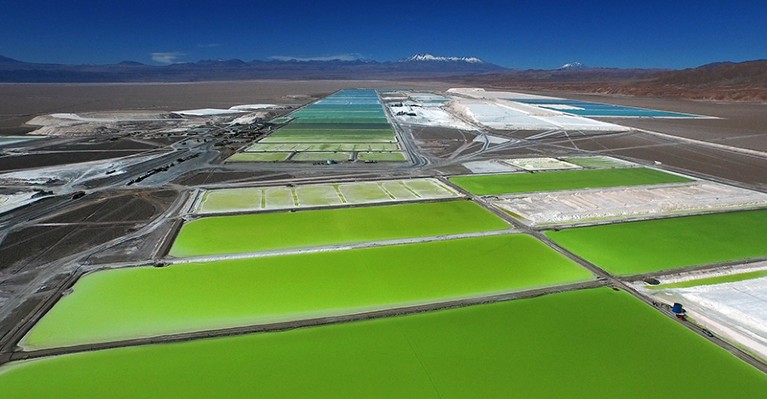
A still from The Breast Milk of the Volcano by Unknown Fields.Credit: Unknown Fields
Ecovisionaries
Royal Academy of Arts, London. Until 23 February.
Sustainability demands creative thinking. At the Royal Academy, architects, artists and designers are collectively reimagining our relationship with nature amid challenges ranging from climate change to species extinction. New commissioned works include The Substitute by Alexandra Daisy Ginsberg. This life-size digital reproduction of the critically endangered northern white rhinoceros (Ceratotherium simum cottoni) was made using film footage enhanced by data from artificial-intelligence company DeepMind. Older works explore endangered fish in Africa’s Lake Victoria (Tue Greenfort’s 2017 Tilapia) and mining lithium for batteries in the Atacama Desert (research studio Unknown Fields’ In The Breast Milk of the Volcano, 2016–18; pictured).

An Athenian amphora from around 530 bc, on display at the British Museum in Troy: Myth and Reality.Credit: The Trustees of the British Museum
Troy: Myth and Reality
British Museum, London. Until 8 March.
The ancient city of Troy has many faces. There is the legendary, war-torn Troy of Homer’s epic Iliad and Odyssey. And there are the Troys uncovered by archaeology in modern-day Turkey: a ‘layer cake’ of sites spanning 3000 bc to ad 500. This blockbuster exhibition covers both, and includes artefacts stretching back three millennia, from Athenian pottery (detail pictured) to Roman sculpture. Evidence suggests that a battle between the Hittite empire and Greece (which they called Ahhiyawa) might have been the real Trojan War.
Origins: Fossils from the Cradle of Humankind
Perot Museum of Nature and Science, Dallas, Texas. Until 22 March.
Hominin fossils rarely leave their countries of origin. Now, two South African skeletons from recently discovered branches of the hominin family tree are on display in the United States: Karabo (Australopithecus sediba) and Neo (Homo naledi). Both are from digs led by palaeoanthropologist Lee Berger. Researchers will attempt to 3D-print missing parts of Karabo’s skeleton, using scans of rocks from the discovery site.
People keen to learn more about hominin history can look to the Iziko South African Museum in Cape Town, where the Origins of Early Sapiens Behaviour Exhibition has been expanded.
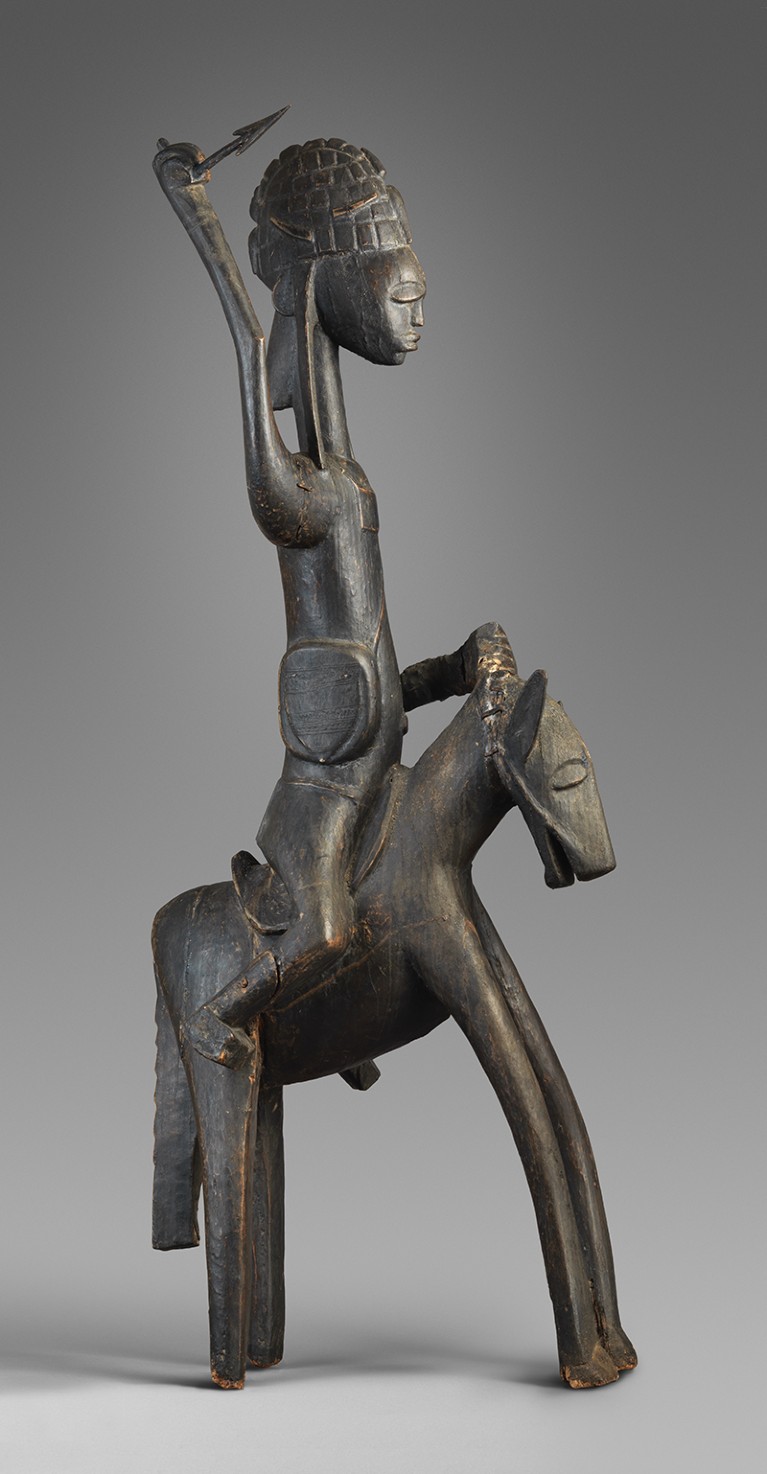
An equestrian statue made by the Bamana people of Mali in the nineteenth or twentieth centuries.Credit: Peter Zeray/The Metropolitan Museum of Art
Sahel: Art and Empires on the Shores of the Sahara
The Metropolitan Museum of Art, New York City. 30 January – 10 May.
Africa’s Sahel (Arabic for ‘shore’) is a vast semi-arid band spanning Senegal, Mali, Mauretania and Niger. This culturally rich region, now plagued by war and desertification, has a fascinating history. A succession of influential kingdoms held sway here, from the empire of Ghana (ad 300–1200) to that of Segu (1640–1861). This show is the culmination of a four-year partnership with academics from Yale University in New Haven, Connecticut, Dakar’s Fundamental Institute of Black Africa and elsewhere. Featured are manuscripts, textiles and sculptures ranging from a 3-tonne eighth-century Senegalese megalith in the form of a lyre to a 7-centimetre statue of a female torso more than 4,000 years old.
As the Met celebrates its 150th birthday in 2020, look out for other shows, from Making Marvels: Science and Splendor at the Courts of Europe (until 1 March) to Cubism and the Trompe l’Oeil Tradition (24 November 2020 to 28 February 2021).
Countryside: Future of the World
Guggenheim Museum, New York City. 20 February – Summer.
Cities house more than half of humanity, but cover less than 3% of Earth’s non-icy lands. Here, architect and urbanist Rem Koolhaas turns to the rural. The show will examine artificial intelligence and automation, the effects of genetic experiments, political radicalization, migration, large-scale territorial management, human–animal ecosystems and the impact of the digital.
Neri Oxman: Material Ecology
Museum of Modern Art, New York City. 22 February – 25 May.
Can useful structures be grown rather than built? So asks Neri Oxman, a medically trained architect who directs the Mediated Matter group at the Massachusetts Institute of Technology (MIT) Media Lab in Cambridge — a facility renowned for fomenting academic creativity at the intersection of art and science. This show will feature 8 major projects from Oxman’s 20-year career in ‘material ecology’: the realm of biologically inspired or created products. Silk Pavilion (2013) used thousands of silkworms to spin a dome in an MIT building; Ocean Pavilion (2014) built structures out of chitosan, a polymer found in crustacean shells.
Uncanny Valley: Being Human in the Age of AI
de Young Museum, San Francisco, California. 22 February – 25 October.
In 1970, Japanese engineer Masahiro Mori noted that lifelike androids occupy an ‘uncanny valley’ — a realm between non-human and fully human that evokes discomfort, even revulsion. This exhibition, a few dozen kilometres from Silicon Valley, explores modern denizens of this uncanny realm. A statue in the museum garden has an active beehive for a head (an allusion to the complex workings of a neural network; pictured); termite mounds symbolize the minions of the crowdsourced marketplace; abandoned patents are 3D-printed to bring them to life. The biases and pitfalls of artificial-intelligence algorithms are thrown into stark relief by a host of art and film projects.
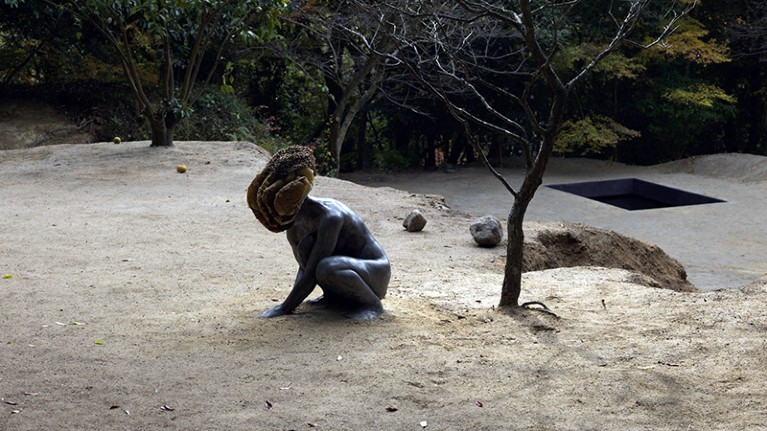
In Pierre Huyghe’s 2017 work Exomind (Deep water), a bee hive symbolizes the workings of the brain.Credit: Fine Arts Museums of San Francisco
Serpentine Galleries 50th Anniversary
The Serpentine Gallery, London. 4 March – 17 May.
The Serpentine Galleries will celebrate its 50th anniversary with events on issues from sustainability to new technologies, guided by curator of ecology Lucia Pietroiusti. Two shows will spearhead the year. Cao Fei: Blueprints will feature virtual reality and installations alongside the artist’s film Nova (2019), all examining the urbanization of Beijing’s Jiuxianqiao district. And Amsterdam-based Studio Formafantasma presents Cambio, a project on the ecological legacy of forestry and wood products. A summer exhibition will kick off the multiyear programme Back to Earth, with works to spur action against the climate crisis (see also ‘Climate change on show’).
Janet Echelman’s 1.8
Renwick Gallery of the Smithsonian American Art Museum, Washington DC. 3 April 2020 – 14 August 2022.
The initial inspiration for Janet Echelman’s ephemeral installations were fishing nets on Indian beaches and Lithuanian lace. She scales them up with high-tech materials to create building-sized works that reflect the global impacts of seismicity. Her 2010 work 1.26 — a fibre sculpture sparked by computer simulations of that year’s earthquake and tsunami in Chile, which shortened the day by 1.26 microseconds — has been hung between buildings, from Colorado to Singapore. 1.8, another installation of knotted fibres, was sparked by the catastrophic 2011 earthquake and tsunami in Tohoku, Japan, which cut off 1.8 microseconds.
Earth Day 50th Anniversary
22 April.
In 1970, some 20 million people across the United States joined the first Earth Day to protest against the constellation of problems plaguing the planet, from toxic dumping to extinctions. This year, the Earth Day Network is launching a series of events to kick anniversary protests into high gear, including a citizen-science mobile app and a registry of Earth-inspired art, theatre, dance and film. See go.nature.com/36xxi1e for more.
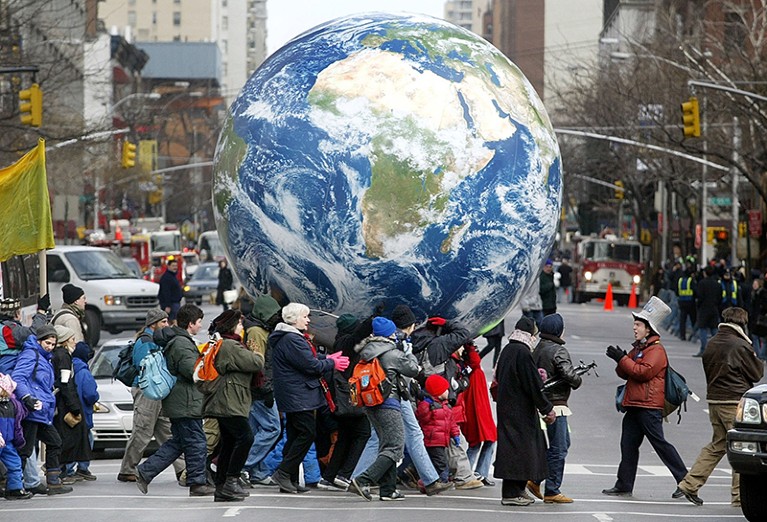
Protesters carry an inflatable globe at a demonstration in 2003 in New York City.Credit: Mario Tama/Getty
Hiroshima: 75th Anniversary
6 August.
The Summer Olympic Games in Tokyo will be threaded with memories of the Second World War nuclear attack on Hiroshima 75 years earlier (pictured, the 9 August Nagasaki attack). The Hiroshima Peace Memorial, for example, will be on the Olympic opening ceremony’s torch-relay route. Memorial events will also be held around the world. The Japanese American National Museum in Los Angeles, California, in partnership with Hiroshima and Nagasaki, will display artefacts belonging to victims of the attacks (Under a Mushroom Cloud: Hiroshima, Nagasaki, and the Atomic Bomb, will show until 7 June). And in Hiroshima itself, the annual 6 August Peace Memorial Ceremony will mark the moment with silence, and a procession of thousands of lanterns floating down the Motoyasu River.

The mushroom cloud triggered by the nuclear attack on Nagasaki, Japan, on 9 August 1945.Credit: Jazz Editions/Gamma-Rapho via Getty
Elephants and Us: Considering Extinction
National Museum of American History, Washington DC. Until 13 September.
From the nineteenth to the mid-twentieth centuries, ivory was a luxury commodity used to produce piano keys, billiard balls, buttons and hair combs. African elephant populations plummeted from more than ten million to fewer than one million. This exhibition tracks US work to stem the trade, starting with the enactment of the African Elephant Conservation Act in 1989. Yet a poaching surge that began in 2006 threatens the bush and forest elephants of Africa: a 2015 count was the first in 25 years to report a decline in elephant numbers.
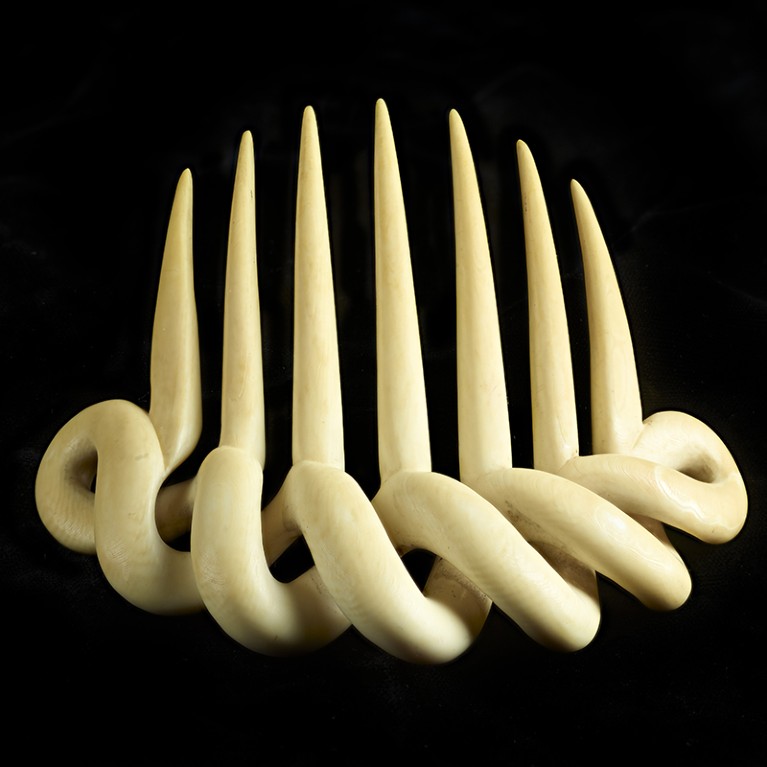
An early-nineteenth-century hair comb made of ivory.Credit: Smithsonian’s National Museum of American History
Turner and the Modern World
Tate Britain, London. 28 October 2020 – 7 March 2021.
Artist J. M. W. Turner was a technophile, famously capturing the Industrial Revolution in paint. Tate Britain celebrates his fascination with machine power in this major exhibition. The show — featuring works from the 1790s to the steam boats and railways of the 1840s — coincides with the showing of finalists for the year’s Turner Prize.

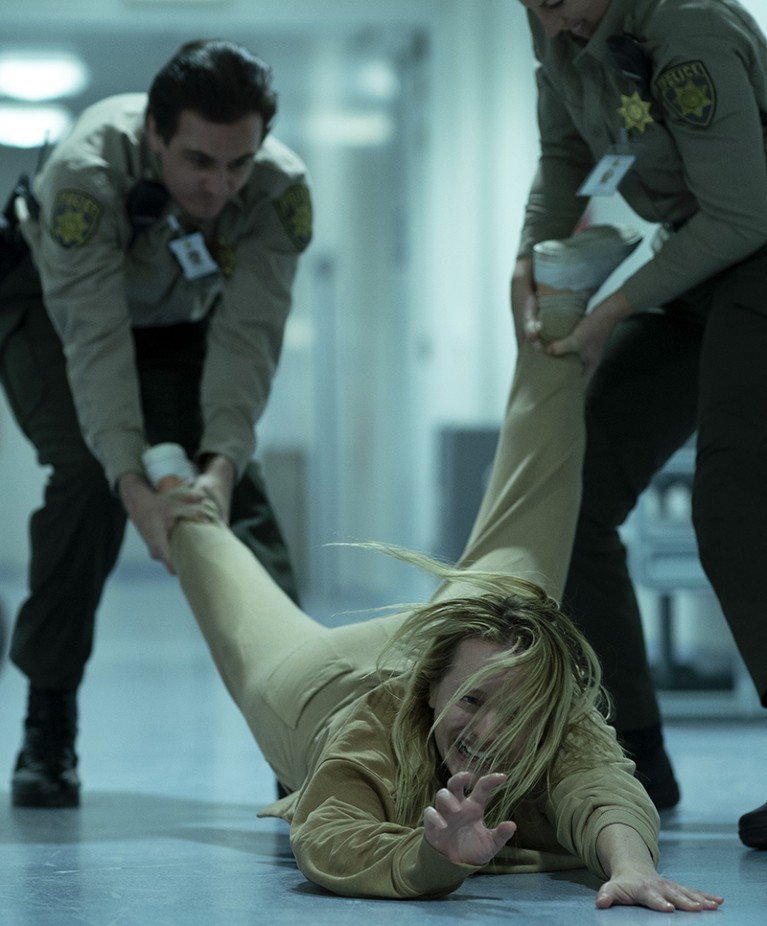

 Antarctic dinosaurs, fashion from fruit, NASA at 60 — hot tickets for 2018
Antarctic dinosaurs, fashion from fruit, NASA at 60 — hot tickets for 2018








